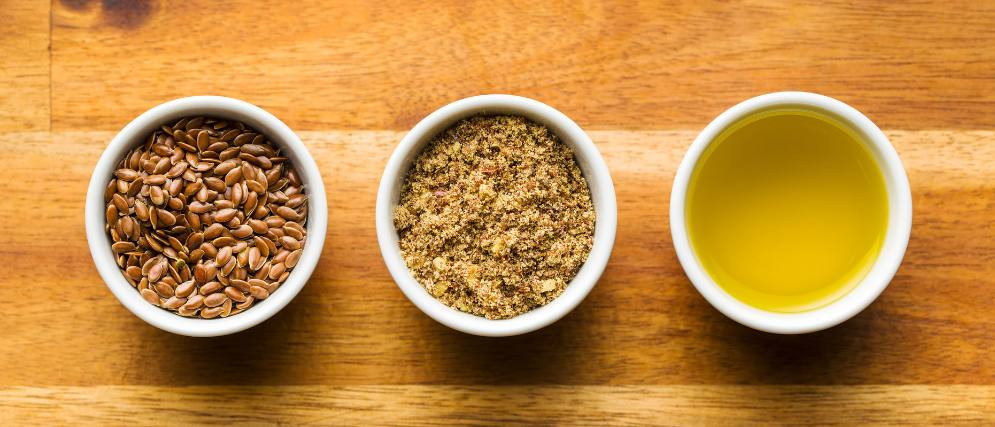I can personally attest to the health benefit of flaxseed. I have used whole flaxseed as a digestive aid for many years. It’s been a huge help with “regularity,” and just helps “keep things moving” – if you know what I mean…and you probably do! And – at least in our stores where I live – no one should complain about the cost. It’s one of the least expensive foods, easily purchased from the “bulk bin” area of almost any supermarket – if your local store has one. Or you can order online (see links below.). Super-simple! And super-healthy!
Aids Digestion
I’ll start with the reason I just referred to – digestion.
If your stomach – from time to time – “stages a rebellion,” flaxseed might just be the answer. Given the kind of diet most Americans (and Canadians and Europeans) eat, it’s not surprising. There is so little fiber in many peoples’ diets, it’s amazing stomachs don’t rebel more often! Flaxseed contains lots of both soluble and insoluble fiber. Also, look at a flaxseed. Doesn’t it look “slippery?!” That’s my observation, anyway…
It’s good to give general consideration to how much fiber we are feeding our digestive systems, but one easy way to help any food “move” is to add flaxseed. That’s been my experience. Flaxseed goes with almost anything. It doesn’t have a strong flavor of its own, you can add it to mashed potatoes, desserts, salads – pretty much anything. Carry a small bag in your pocket. No, I’m not the only person I know who has done that! It depends on how much you want to avoid constipation and a host of other digestive woes.
Just eat your flaxseed with sufficient liquid to help it perform at its best.
Amazing Heart-Health Benefits
Those who don’t know about flaxseed’s digestive benefits might know about its heart benefits! It’s an absolutely amazing boost to heart health. The primary ingredient is alpha-linolenic acid, which is a type of omega-3 fatty acid that promotes heart health, fights “bad” cholesterol, and reduces inflammation. So a spoonful of flax could potentially help keep the cardiologist away!
Lignans: A Powerful Antioxidant
Flaxseed is a rich source of lignans – a powerful antioxidant with a number of benefits. One of the main benefits is that it can potentially reduce cancer risk.
What types of cancer? In particular, breast and colon cancer.
There have been studies that have indicated that lignans may reduce the risk of breast cancer. The antioxidant and anti-inflammatory qualities of the lignans in flaxseed may also – according to research – reduce the risk of colon cancer.
Here’s another way flaxseed can reduce the risk of colon cancer: fiber! Frequent bowel movements, according to studies, are a counter-indicator of colorectal cancer. The less frequent the bowel movements, the more likely the occurrence of colorectal cancer. The fiber in flaxseed – as already mentioned – is amazing at preventing constipation!
Whole vs. Ground Flaxseed
I was going to look at the weight-management aspect of flaxseed – and realized that the way you eat your flaxseed may depend on the benefit you are looking to get from flaxseed.
The weight management aspect of flaxseed is partly based on its satiety factor (how long you feel full after eating it) and its ability to regulate and stabilize blood sugar levels. This can potentially reduce the craving for sugary snacks.
Studies have shown that supplementing with flaxseed can cause significant reductions in body weight, BMI and belly fat.
However: if you get all the calorie content into your “system” that flaxseed contains – as you are more likely to do in its ground form – you might need to consider those calories in any weight loss plan, since flaxseed clocks in at 53 calories per tablespoon. In research I did on the topic, and my own “personal common sense,” if you eat flax whole, you will get the anti-constipation effect, but you may not get all the calories. But then neither will you get as many of the beneficial nutrients contained in flaxseed.
So it’s a “Catch-22” situation; my opinion is that if you eat it whole, you don’t need to worry about calories. Much of the flaxseed – after having performed its laudable task of keeping you regular – will simply pass through your system undigested.
However, you may not get all the nutrients! So use flaxseed to meet your greatest need, whatever that may be.
How to Use Flaxseed

As previously mentioned, you can add it to virtually anything. I can’t actually think of any food that one could actually say the taste of the flaxseed “clashed” with the taste of the food it’s being added to! Particularly in the whole seed form, it has almost no flavor.
Now in its ground form, it does have a slightly nutty flavor. So if it were going to clash with a food, it would probably be in the ground form.
Otherwise, add it to:
- cereal
- sandwiches
- potatoes (in any form)
- vegetables
- desserts
- smoothies
- meat or veggie patties
- add to cookies, muffins and breads.
Flaxseed oil is also worthy of mention. Flaxseed oil has none of the fiber of whole or ground flaxseed, and not many of the lignans, but flaxseed oil has concentrated omega-3s, is easy to digest and versatile, is relatively low in calories, has a long shelf life, and has potential benefits for skin and hair health.
Conclusion
Flaxseed, whether in ground, whole, or oil form, is an economical and easily obtainable natural food that delivers a formidable punch in terms of health benefits.
Do you have any experience with eating flaxseed? Have you experienced any particular health benefits from it? Feel free to comment in the comments section below!


This is a great post and a reminder that i should eat more flax seed! I used it for a while in a keto diet to boost my fat intake. I also was told that I should consume the ground flax seed in order to gain the nutrients. In Keto, i wasn’t as concerned with calorie intake. I am not on Keto now, but regularity is always an issue with me, as well as with my wife. We should look into getting flax seed to add to our diet. How much flax seed should we consume in a day? Is it possible to eat too much?
Thanks for the comment! I have not seen anyone say anything about eating too much. What I like to do is just throw a couple teaspoons into oatmeal, or maybe a teaspoonful on top of a baked potato, for example… My thought for myself is just, how much fiber do I think I might need to keep this food moving! 🙂 Might be a funny criteria, I know, but…
I do think it’s worth doing whatever is necessary to be “regular.” It’s quite important, that’s what I’ve understood for myself…
I couldn’t agree more with this post! Flaxseed is indeed a simple and cost-effective way to boost both digestion and heart health. Personally, I’ve added it to various dishes without compromising the taste. It’s a versatile super food that deserves a spot in everyone’s pantry.
Personally I use my flaxseeds ground and add it to cereal, and I even put it on a salad for a nuttier taste.
Thank you for your comment! It does give a pleasant nutty taste if they are ground – or some crunch if they are not! 🙂
Hi Daniel, I really enjoyed reading this article on the health benefits of flaxseed. You explained very well how flaxseed can improve digestion, lower cholesterol, reduce inflammation, and prevent constipation. I also liked the tips you gave on how to use flaxseed in your diet.
I noticed that flaxseed can help control blood sugar levels and inflammation, which are important factors for diabetes prevention and management. However, I also wonder if there are any drawbacks or risks of eating flaxseed for people with diabetes. Can you comment on this topic?
Thank you for sharing this useful information.
Hmmm…everything I’ve read seems to indicate that it helps to stabilize blood sugar. This is from Healthline.com: “Flax seeds and flaxseed oil have multiple health benefits that may help people with diabetes manage the condition. Since they’re rich in fiber, omega-3 fatty acids, and unique plant compounds, they may improve blood sugar control, insulin sensitivity, and reduce risk factors for heart disease.”
So, based on what I’ve seen, it seems that it would be great for someone with diabetes. I didn’t see any drawbacks mentioned anywhere.
Thanks for your comment!